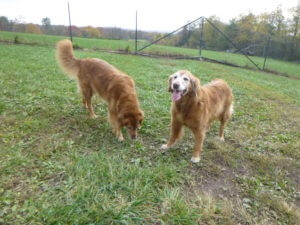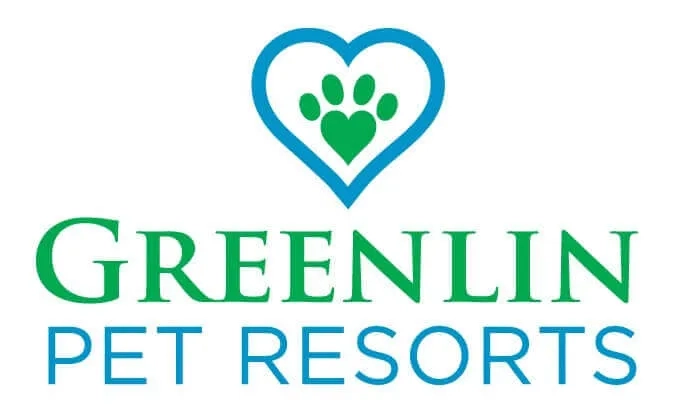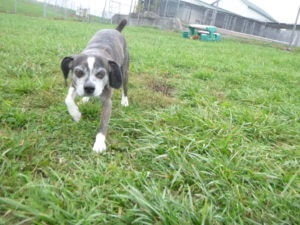What to Expect When You Adopt an Older Dog
Whether you’re adopting your first dog or your tenth, adding a senior dog to the family can be a great choice. Older dogs tend to be extremely loyal companions, prone to affection, and have a calmer demeanor overall. Also, older dogs may not have many of the problems that can lead to stress when adopting a puppy, such as going to the bathroom inside or insatiable chewing.

With that said, adopting an older dog is not always a walk in the park. There are many accommodations you must be willing to make, and you must be prepared to monitor their health closely to anticipate any chronic conditions. Further, the dog has had years of experiences outside of your control, so they may hold “beliefs” that you don’t understand at first, such as paralyzing fears of certain things or aggression in response to unexpected situations.
Keeping all this in mind, know that adopting an older dog is a journey that you two will share together. Like all journeys, you should be prepared for both the likely and the unexpected, so that you can give your senior pup all the love and care they deserve in the twilight years of their life.
Expect Lower Energy Levels
The number one difference between all older dogs and younger dogs is that an older dog won’t have quite the same energy levels. Even high-energy breed types like herders or terriers may be more prone to relaxing and just generally “taking it easy.”
That’s not to say that older dogs don’t need stimulation! You should make sure that your dog is engaged every day, and they should be able to enjoy light exercise at least daily.
With that said, keep your dog’s preferences and capabilities into account. Don’t try to push them too hard, and work gradually when trying to increase their interest in things like toys or car rides.
Also, keep in mind that their physiology is different than younger dogs in many ways. For one thing, they are more prone to overheating or hypothermia.
“They’re less able to thermoregulate,” veterinary behaviorist Nicholas Dodman explained to NPR, “so we have to take account of that by making sure they have some kind of blanketlike coat or contraption on to keep them warm and not keep them out so long in cold weather. The same goes for heat. You really don’t want to leave them out in the yard, especially tied up on an extremely hot day. They can dehydrate. They’re less able to cope with the change in temperature [than the average dog].”
Develop Mutual Respect
When you first get your senior dog, put yourself in the mindset of a housemate rather than a pet when trying to understand their behaviors. They are entering a whole new situation with unfamiliar people — and, likely, unfamiliar pets. They may have unexpected responses to situations, and trust might come at a premium within these first few weeks.
As such, take things slowly, be patient, and be empathetic to what your new family member is going through. Keep in mind many “odd” behaviors could be the result of neglect, abuse, or trauma.
For instance, your senior dog may have a powerful fear response when exposed to certain noises or discipline in general. They may also have food aggression, or not get along well with other pets.
Watch these behaviors closely, and do intervene to prevent any injuries or harm from occurring. But take things slowly when it comes to working through unwanted behaviors. After all, dog training often relies on the bond between owner and pet, and these bonds are still in the process of forming when you first adopt an older dog.
“Teaching new behaviors will be easier to train once your new dog is less stressed and trusts you,” notes Susan Sarubin, PMCT-2, CPDT-KA. “Be patient, capture the behaviors you like, and forgo dedicated training sessions until your dog is happily interacting with you and appears calm and relaxed in his new home.”
Sarubin suggests that you can help establish comfort by giving your new dog, “a quiet place to settle in for a few days. This should be located somewhere that enables her to see and/or hear everything going on in the house, or to retreat without disturbances if she prefers.”
Unfamiliar things can be positive experiences for your older dog, too. Wes Siler of Gizmodo relates his experience with adopting an older cocker spaniel and his introduction to new delights: “The first time we gave him a bone, he had no idea what to do with it. He’d evidently never had one before. He just sat there with it in his mouth, wiggling his little tail stub and acting incredibly proud of his new meaty-tasting thing.”
You Can Teach an Old Dog New Tricks!
Old dogs typically come with better behaviors built-in, even if it’s just a function of age. But they may also have nasty habits that have been ingrained for years. Many times, these habits could be a product of neglect. For instance, a dog that’s used to being confined indoors for days may think the rug is a perfectly acceptable place to do their “business”, the same if they’ve been outside their whole life.
Even though these behaviors can be explained, that doesn’t mean they should be tolerated. After all, most desired behaviors are in the mutual best interests of both pet and owner. So don’t think that any problematic behaviors are automatically set in stone, and do feel motivated to address them if they can have positive benefits to the dog’s well-being and your own lifestyle.
“Another misconception is that adult dogs are harder to train or come with behavior issues left behind from previous owners,” explains ASPCA Adoption Center Senior Director Jorge Ortega. “While it’s true that adult and senior dogs typically have established personalities, older dogs are perfectly capable of learning, and the more consistent you are about working regularly with your dog, the easier it is for them to learn, no matter how old they are.”
The key is patience patience patience. Don’t let your emotions affect your training, and try to remain consistent. Seek professional dog training assistance if you need it. A trainer can not only help achieve breakthroughs during the session, but they can also give you tips based on their observations so that learning can continue in the home.
Keep a Close Eye on Health Issues
On the one hand, older dogs have fewer health surprises related to congenital conditions or early environmental factors. You’ll likely know about these when you adopt!
On the other hand, older dogs are going to encounter chronic health problems at some point in their life. This can mean something like arthritis or mobility issues, but it can also mean cancer, diabetes, or other conditions that are difficult to manage.
The best approach in this situation is diligence and prevention. Visit the vet almost immediately after the adoption, and go through a thorough checklist to rule out possible health issues that can impact your dog’s quality of life. You may be in for something minor, like a need to pull a tooth, but there could also be an underlying issue that went undiagnosed because of a lack of care.
“Talk to your veterinarian about how to care for your older pet,” says the American Veterinary Medical Association, “and be prepared for possible age-related health issues. Senior pets require increased attention, including more frequent visits to the veterinarian, possible changes in diet, and in some cases alterations to their home environment.”
The AVMA also reminds us that older dogs can be at risk for the same problems that we tend to get, including heart disease, liver disease, kidney disease, joint or bone disease, senility, and weakness.
In addition to these chronic conditions, your pet could encounter hearing or vision loss as they age.
“While weight and mobility can be proactively managed and the development of tumors screened for early intervention, hearing and vision losses are more problematic,” points out the American Kennel Club.
Your best approach is always proactive checkups and diligent management of any known conditions, providing your senior pet the best quality of life possible in their final years.
Don’t Hesitate to Ask for Help and Support From Experienced Senior Dog Care Facilities
Senior dogs may need different accommodations when it comes to dog boarding, daycare, or other services. Some facilities are unprepared for these adjustments, but at Greenlin Pet Resorts our staff is ready to accommodate your senior pet.
Our dog boarding for seniors can provide extra wellness checks and medications as-needed. Dog daycare for seniors ensures that your older dog isn’t stuck in a pile of rambunctious puppies during their stay, as we separate playgroups by age, size, and personality.
We are ready to give your older pup the five-star treatment, so any time you need assistance with boarding, day camp, or senior dog training, you can call on us for help.
Find out more about how Greenlin Pet Resorts can help support your deepening relationship with a newly adopted senior dog when you call or visit a location near you.

